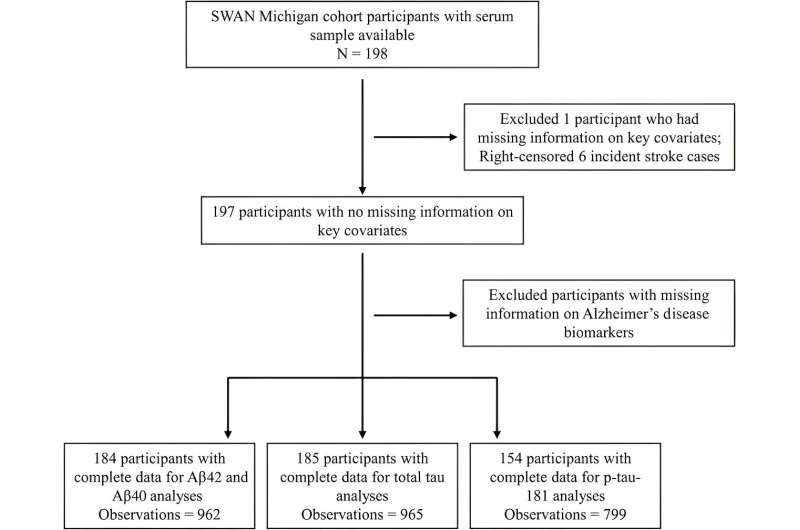This article has been reviewed according to Science X's editorial process and policies. Editors have highlighted the following attributes while ensuring the content's credibility:
fact-checked
peer-reviewed publication
trusted source
proofread
Midlife blood test may predict cognitive decline, Alzheimer's in later life

Researchers from the University of Michigan have connected two blood biomarkers to changes in cognitive function in women in midlife, opening a potentially powerful path to noninvasive, earlier detection and interventions for Alzheimer's disease and other dementias.
The study analyzed two blood-based serum biomarkers, amyloid β (Aβ)42, Aβ42/40 ratio, and phosphorylated tau181 (p-tau181), and tracked their levels in middle-aged women and compared results of a series of neurological function tests. The research was published in today in the Alzheimer's & Dementia journal.
The analysis found that higher levels of p-tau 181 were linked to accelerated cognitive decline and, likewise, lower AB 42/40 levels were associated with faster cognitive decline.
Their data came from 192 middle-aged women who were followed for 14 years through the Study on Women's Health Across the Nation, Michigan Cohort.
"This is a new area of study, and it is very promising, but of course we are in need of a larger and more diverse sample," said Xin Wang, a research assistant professor in the Department of Epidemiology at U-M's School of Public Health.
The findings suggest that midlife blood AD biomarker assessments may serve as early predictors of cognitive decline, offering an opportunity for early detection and prevention before development of irreversible dementia, Wang says.

Besides the possibility of earlier intervention for Alzheimer's disease and other forms of dementia, the blood biomarker tests such as those studied by the researchers could lead to less invasive, possibly more affordable methods of neurological testing, which currently calls for lumbar punctures for cerebral fluid and expensive PET scans for imaging.
"It's important to note that the presence of the biomarkers that we tested doesn't mean there is Alzheimer's Disease," Wang said. "However, we know they are a central part of neuropathological changes. These pathological changes are important to know of earlier than later."
The researchers chose midlife as a "pivotal period" to test for and identify cognitive decline due to two major changes in women: 1) menopausal transition, which is characterized by sharp reduction in estrogen levels and irreversible ovarian alterations and leads to changes in cognitive function, and 2) higher prevalence of cardiometabolic risk factors such as hypertension and diabetes, which are also associated with elevated risk of cognitive decline and dementia in older age.
Wang stressed that the findings are based on "only a very small sample, but the results are promising and an important building block for research with a larger, more diverse sample."
More information: Xin Wang et al, Blood‐based biomarkers for Alzheimer's disease and cognitive function from mid‐ to late life, Alzheimer's & Dementia (2023). DOI: 10.1002/alz.13583




















